Digital Poster
Psychiatric Disorders Other Than Depression
ISMRM & ISMRT Annual Meeting & Exhibition • 10-15 May 2025 • Honolulu, Hawai'i

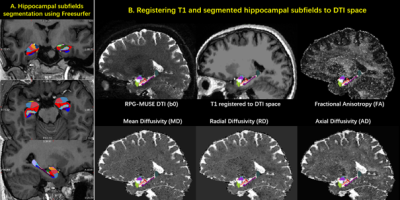 |
Computer Number: 129
4096. Submillimeter
whole-brain diffusion tensor imaging reveals diffusion
anisotropy alterations in hippocampal subfields of schizophrenia
K. Wang, Y. Sun, H. Liang, N. Hu, S. Lui
West China Hospital of Sichuan University, Chengdu, China
Impact: The observed hippocampal anisotropy alterations
may serve as sensitive imaging biomarkers for schizophrenia,
potentially associated with cognitive impairment. These
findings offer a promising foundation for further
exploration of targeted clinical interventions in SCZ
patients.
|
|
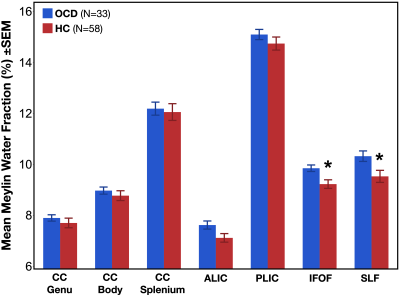 |
Computer Number: 130
4097. Evidence
of lower myelin content in selective white matter tracts of OCD
children/adolescents using a myelin water imaging approach
J. Stanley, J. Losiowski, P. Easter, D. Khatib, P. Szura, R.
Neill, U. Rajan, J. Bellamy, D. Rosenberg, V. Diwadkar
Wayne State University School of Medicine, Detroit, United States
Impact: Compared to healthy individuals, OCD
children/adolescents show deficits in myelin content in
association fibers, as well as evidence suggesting a lack of
progressive maturation of both (anterior) projection and
association fibers in pediatric OCD, which warrants
longitudinal studies.
|
|
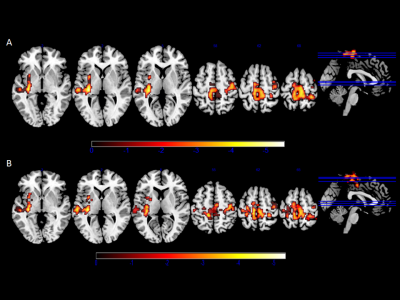 |
Computer Number: 131
4098. Abnormalities
in static and dynamic intrinsic neural activity and
neurotransmitters in first-episode obsessive-compulsive disorder
Q. Tao, Y. Zhang, j. cheng, W. Wang, B. Wen
The First Affiliated Hospital of Zhengzhou University, Zhengzhou, China
Impact: It is impossible to fully reveal complex mental
diseases by relying on only one method. Multi-directional
exploration of OCD with the help of neuroimaging and
microscopic neurotransmitter combination is conducive to
early clinical diagnosis, accurate treatment, and even
prognosis prediction.
|
|
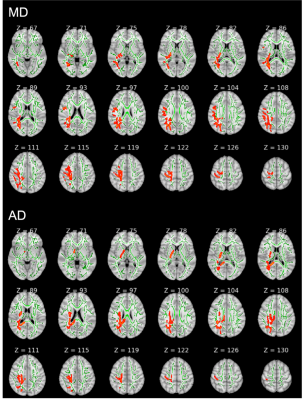 |
Computer Number: 132
4099. Multimodal
MRI Reveals Neurobiological Alterations in High Schizotypy:
Insights from Diffusion and Perfusion Imaging
Z. Wei, W. Mao, L. Wang, Y. Wang, X. Wang, Y. Huang, L.
Wang, H. Hu, F. Zong, Y. Wang, S. Eskildsen, R. Chan, R. Xue
Institute of Biophysics, Chinese Academy of Sciences, Beijing, China
Impact: Our findings suggest early potential biomarkers
of schizophrenia through multi-modal MRI, which is critical
for early diagnosis and intervention strategies in high-risk
populations.
|
|
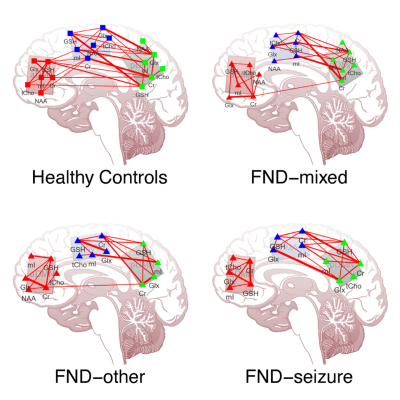 |
Computer Number: 133
4100. Neurometabolic
Network (NMetNet) for Functional Neurological Disorder in
Children and Adolescents
Z. Lan, S. Foster, M. Charney, K. Kozlowska, A. Lin
Brigham and Women's Hospital, Boston, United States
Impact: The study’s findings may guide future research
on targeted treatments for FND that address energy
metabolism and oxidative stress. It enables exploration into
interventions that restore neurometabolic balance, fostering
new therapeutic approaches and improving patient care and
outcomes.
|
|
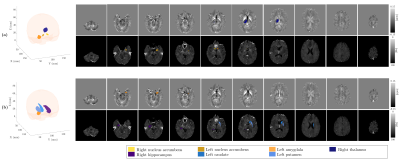 |
Computer Number: 134
4101. Interpretable
Machine Learning Model for Characterizing Magnetic
Susceptibility-based Biomarkers in First Episode Psychosis
P. Franco, C. Montalba, R. Caulier-Cisterna, C. Molovic, A.
González, J. P. Ramirez-Mahaluf, J. Undurraga, N. Crossley,
C. Tejos
Universidad Andrés Bello, Santiago, Chile
Impact: This study identifies key brain iron
concentration biomarkers using QSM and R2* in FEP, achieving
76% classification accuracy. It highlights the potential for
improved early detection and treatment response prediction,
paving the way for enhanced clinical outcomes in
schizophrenia management.
|
|
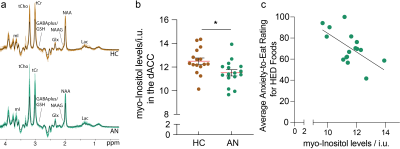 |
Computer Number: 135
4102. Myo-inositol
in the Dorsal Anterior Cingulate Cortex is Associated with
Anxiety-to-Eat and independent of Body Weight in Anorexia
Nervosa
Y. Song, S. Guo, C. Davies-Jenkins, A. Guarda, R. Edden, K.
Smith
The Russell H. Morgan Department of Radiology and Radiological Science, Johns Hopkins University School of Medicine, Baltimore, United States
Impact: Our findings provide new insight into the
clinically challenging feature of eating-related anxiety in
AN, and indicate mI levels in the dACC could serve as a
novel biomarker of illness severity or potential therapeutic
target in individuals vulnerable to AN.
|
|
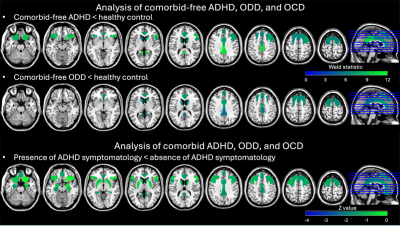 |
Computer Number: 136
4103. Reduced
fMRI-complexity in pre-adolescent children with comorbid-free
and comorbid ADHD, ODD, and OCD diagnoses
R. Zhang, C. Steven, D. Wijesinghe, L. Aksman, S. Murray, C.
Duval, D. Wang, K. Jann
University of Southern California, Los Angeles, United States
Impact: Resting-state fMRI-complexity for ADHD
comorbidity remains poorly understood, although reduced
complexity in ADHD was reported. Our study demonstrates
reduced complexity in ADHD pre-adolescents, both in
comorbid-free cases and in those comorbid with oppositional
defiant disorder, obsessive-compulsive disorder, and other
conditions.
|
|
|
Computer Number:
4104. WITHDRAWN |
||
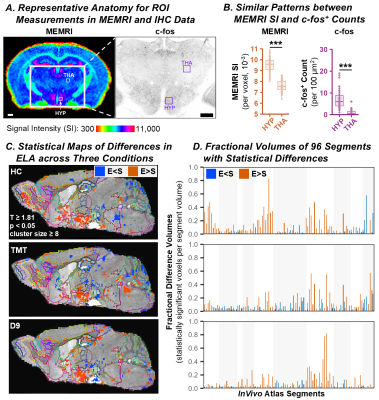 |
Computer Number: 137
4105. Longitudinal
Mn(II)-enhanced MRI illuminates altered adult brain responses to
threat after early life adversity.
T. Uselman, R. Jacobs, E. Bearer
University of New Mexico Health Sciences Center, Albuquerque, United States
Impact: By providing greater specificity for previously
hypothesized disruptions and revealing novel contributions
from other regions, our findings will direct future
investigations into localized disfunctions and guide
conceptual understanding for how condition-dependent
dynamics of brain state may underly ELA-associated
vulnerabilities.
|
|
|
Computer Number:
4106. WITHDRAWN |
||
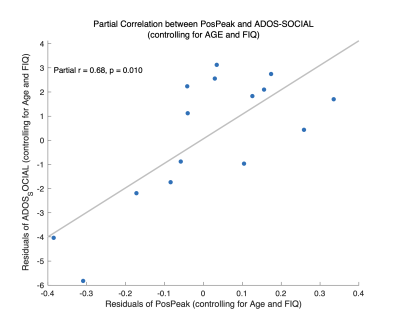 |
Computer Number: 138
4107. Altered
Positive Coupling of gBOLD and CSF Oscillations Correlates with
Social Dysfunction in ASD Children
L. Wang, Y. Qin, Y. Wang, X. Li, X. Li, Y. Zhu, W. Sheng
Xi'an Daxing Hospital, Xi'an, China
Impact: Our findings contribute a novel physiological
marker linked to social impairment in ASD, potentially
guiding future neurovascular research in ASD. This work
opens avenues for identifying neurovascular and CSF
biomarkers applicable to other neurodevelopmental disorders.
|
|
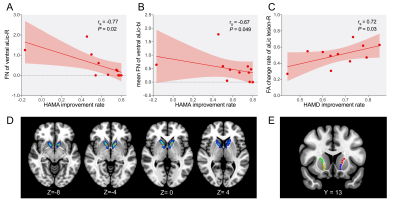 |
Computer Number: 139
4108. The
White Matter Microstructure and Functional Network Basis of
MRgFUS Treatment in OCD Patients
P. Zhang, H. Paerhati, B. Sun, Q. Gong
Huaxi MR Research Center (HMRRC), Department of Radiology, West China Hospital of Sichuan University, Chengdu, China
Impact: This is the first longitudinal comparison of
neuro-microstructure and functional connectome in MRgFUS
treatment. It highlights the significance of the dorsal
aLic, contributing to understanding the neural basis of
MRgFUS for OCD, and suggests imaging features for predicting
treatment efficacy.
|
|
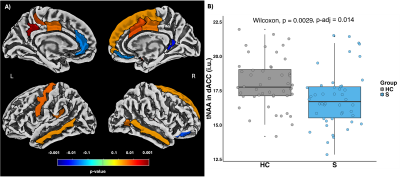 |
Computer Number: 140
4109. Structural
and neurochemical changes in the anterior cingulate cortex of
nicotine-dependent users
H. Monsivais, F. Versace, J. Salvador, A. Baldizon, M.
Wintermark, B. Taylor
The University of Texas MD Anderson Cancer Center, Houston, United States
Impact: Our early findings align with prior research
linking cigarette use to structural/neurochemical brain
changes in reward-related regions. Next, we will further
advance in our multi-parametric neuroimaging study to
investigate how our findings relate to behavior, brain
function, and addiction severity.
|
|
 |
Computer Number: 141
4110. Neurometabolite
Changes Linked with Social Cognition Improvements in Autistic
Youth Following a Social Skills Intervention
R. Jalal, B. Bartnik Olson, H. Gutierrez, A. Nair
Loma Linda University, Loma Linda, United States
Impact: This work connects behavioral and brain-based
approaches in ASD treatment, helping identify markers of
treatment response and improving the accuracy of
interventions to enhance social outcomes for autistic youth.
|
The International Society for Magnetic Resonance in Medicine is accredited by the Accreditation Council for Continuing Medical Education to provide continuing medical education for physicians.